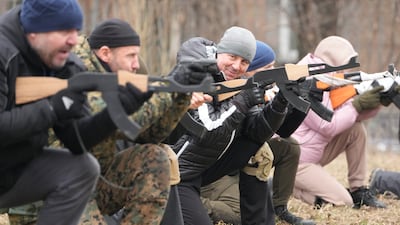Weeks of brinkmanship in the east of Ukraine have now turned into what was before then unthinkable to many. Russia, the country with the highest number of nuclear warheads, has launched what appears to be an invasion of the interior of Ukraine. After just one day of fighting there is no longer any doubt that Europe has descended into potentially the most dangerous conflict since the Second World War.
The world is still far from a return to the level of bloodshed seen in the early 20th century, and these terrible developments have rightly resulted in intense calls for de-escalation and diplomacy. But making a loud-enough case for restraint will not be easy. A horrible effect of war, borne out by history, is that it immediately makes interstate rivalries harder to solve. It is very difficult to call for dialogue once the bombs have started dropping.
Even ascertaining the truth that forms a basis for negotiations becomes difficult to find. As US Senator Hiram Warren Johnson said during the First World War, "the first casualty of war is the truth". We do not know the true extent of today's and yesterday's losses, and uncovering them will be difficult in a conflict in which misinformation has proven a key weapon.
One of the few early certainties is that the international community is almost unanimous in its calls for peace. In one of the most severe remarks in his tenure, UN Secretary General Antonio Guterres used social media to implore: "Under the present circumstances, I must change my appeal: President Putin, in the name of humanity, bring your troops back to Russia. This conflict must stop now.”
Such direct statements are warranted. Many thousands of lives are on the line with no immediate clear end in sight to the crisis. Thoughts must now must be with those most in danger. If long-term diplomacy has failed in this instance, emergency aid does not have to. As roads out of Ukraine's capital are log-jammed with people trying to flee, neighbouring countries should be willing to open their doors to what could well become another refugee crisis for the continent. Germany has already pledged to help its Eastern European neighbours in the event of an influx. Countries that are not directly affected by the huge movement of people should understand this is more than Europe's problem, but a humanitarian one in which the entire international community should chip in.
And while it will be tested in the upcoming weeks, a sense of global resolve for solidarity and a peaceful way out is there. A statement by Kenya's ambassador to the UN has gone viral – he draws on the coexistence of diversity and broad peace found across Africa’s borders, in spite of them having been drawn up by colonial powers, to build a case against the invasion of sovereign Ukraine. The crisis is reminding the whole world, not just the West, of the value of self-determination, global solidarity and the international order.
This awareness is perhaps even more acute in a world that has been dealing with the pandemic, another global crisis solvable only through co-operation. What is particularly tragic about the situation in Ukraine, however, is that it was much easier to prevent than any pandemic.
And while it will be a lot harder to put a full stop to it now, it is still possible. A monumental change hit Europe on Thursday. Another is needed, in the form of a swift retreat from the battlefield towards the negotiating table.













































































